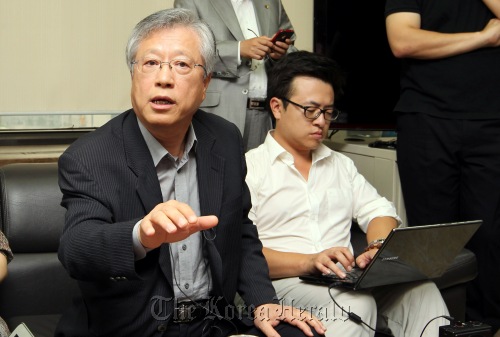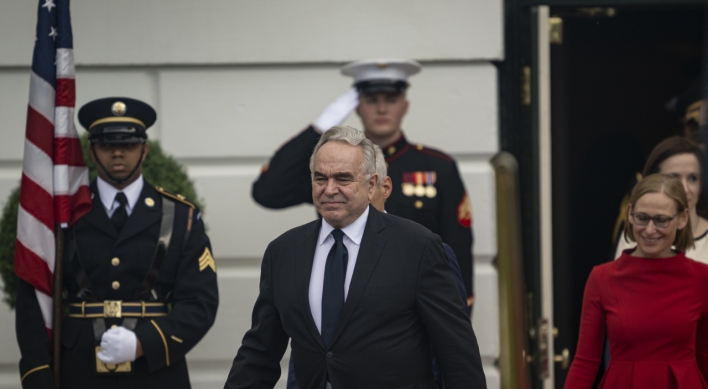Fierce bidding for the 1.8 GHz bandwidth ends at 995 billion won
SK Telecom acquired the 20-megahertz band of the 1.8 gigahertz range for 995 billion won ($926.67 million) in the country’s first wireless broadband spectrum auction after its rival KT Corp. withdrew from the competition on Monday.
The Korea Communications Commission said KT decided to raise the white flag in the battle for the 1.8 gigahertz wireless broadband spectrum in the 83rd round of bidding as the price neared 1 trillion won.
SK Telecom acquired the 20-megahertz band of the 1.8 gigahertz range for 995 billion won ($926.67 million) in the country’s first wireless broadband spectrum auction after its rival KT Corp. withdrew from the competition on Monday.
The Korea Communications Commission said KT decided to raise the white flag in the battle for the 1.8 gigahertz wireless broadband spectrum in the 83rd round of bidding as the price neared 1 trillion won.

KT had put pause to the auction process earlier on Friday after SKT raised the bidding price to 995 billion won. The minimum price for the range was 445 billion won.
“We have regrets that this radio frequency auction was overheated to a point which sparked concerns,” said SKT officials. “(However,) we expect to offer better services to our customers through obtaining this wireless broadband spectrum that will be used for the fourth generation Long Term Evolution technology.”
KT, on the other hand, took home the 800 megahertz range for 261 billion won, claiming it gave up on the 1.8 gigahertz bidding race because it had other areas of focus, such as cloud computing and developing mobile applications and contents, according to its chairman Lee Suk-chae.
“Telecoms have a role to play and we can’t perform our duties in other fields if we spend too much money on (the acquiring of radio spectrum),” he told reporters.
The competition to take away the frequency bands in the 1.8 gigahertz and 2.1 gigahertz ranges have been overheated because the radio spectrums are to be used for the 4G communication technologies such as LTE.
LG Uplus was lucky to become the sole bidder for the 2.1 gigahertz range due to state regulation, which forced SKT and KT to take part in over 80 rounds of bidding for the 1.8 gigahertz range.
The two mobile carriers both needed the new radio spectrum to either improve or start 4G LTE services since their existing radio spectrums are currently occupied by 2G and 3G service subscribers.
The carriers will pay one-fourth of the final bidding price for their radio spectrum within three months of state authorization and pay the remaining amount in equal sum over their period of use. The license for the wireless broadband spectrums will be given for 10 years.
By Cho Ji-hyun (sharon@heraldcorp.com)



![[Exclusive] Korean military set to ban iPhones over 'security' concerns](http://res.heraldm.com/phpwas/restmb_idxmake.php?idx=644&simg=/content/image/2024/04/23/20240423050599_0.jpg&u=20240423183955)




![[Pressure points] Leggings in public: Fashion statement or social faux pas?](http://res.heraldm.com/phpwas/restmb_idxmake.php?idx=644&simg=/content/image/2024/04/23/20240423050669_0.jpg&u=)

![[Herald Interview] 'Amid aging population, Korea to invite more young professionals from overseas'](http://res.heraldm.com/phpwas/restmb_idxmake.php?idx=644&simg=/content/image/2024/04/24/20240424050844_0.jpg&u=20240424200058)








